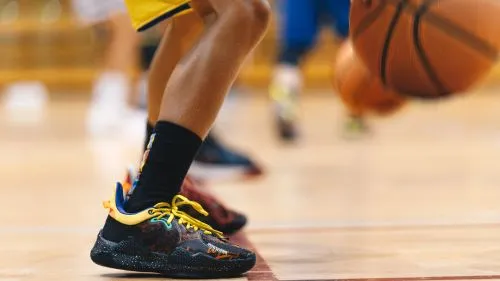There’s a phrase I came up with while working with a basketball player to help him break free from perfectionism. It was simple, even a little silly—but it stuck:
“Trying to play perfect causes you to play like garbage.”
That might sound harsh, but if you’re an athlete who struggles with perfectionism, you know how true it is.
When athletes try to be perfect, it doesn’t elevate their game—it actually leads to poor performance. Over the years, I’ve seen this happen in one-on-one coaching again and again.
Perfectionism creates tension, increases anxiety, and ultimately leads to a drop in performance.
So in this article, I want to walk you through why trying to play perfectly hurts you, how it affects your mindset and performance, and what you can do instead to find a healthier and more productive approach.
The Problem With Forcing a Perfect Performance
When you’re trying to play perfectly, you’re not going into a game simply wanting to compete—you’re entering it with the expectation that everything must go exactly to plan.
You tell yourself things like:
-
I have to make every basket.
-
Every shot on goal needs to go in.
-
I have to get a hit every time I’m at the plate.
That’s a lot of pressure.
With these kinds of expectations, you end up trying to force a good performance instead of letting it come naturally. And this forced mindset creates mental tension. You begin overthinking, tightening up, and becoming consumed by the fear of messing up.
Your mind naturally starts to wander to:
-
What if I don’t play well?
-
What will people think of me?
-
What will happen if I fail?
This creates anxiety and prevents you from playing freely, which is exactly what you need to perform your best.
Perfectionism Makes It Harder to Move On from Mistakes
Another way perfectionism hurts athletes is in how you respond to mistakes.
If you struggle with playing perfectly, think back to your last game: Did you have a hard time moving on after a mistake?
Most athletes I work with who deal with perfectionism get incredibly frustrated after just one error. And that frustration builds with every additional mistake. It becomes harder and harder to bounce back.
That’s why, when I work with an athlete on managing frustration, one of the first things we do is reframe their expectations. We shift the focus away from needing to be perfect and toward setting controllable goals for the game.
You Can’t Control Perfection
Here’s the truth: perfection isn’t something you can control.
Mistakes are inevitable. No matter how hard you train, you’re going to mess up sometimes. That’s part of sports—and part of being human.
When you expect yourself to be perfect, you’re setting a goal that’s impossible to achieve. And when you don’t reach that impossible goal, you feel like a failure—even if you actually played well.
Instead of holding yourself to an uncontrollable and unrealistic standard, start setting goals based on what you can control.
Things like:
-
Your effort
-
Your attitude
-
How well you move on from mistakes
-
Staying locked in on the process
When you focus on these controllables, your perfectionism doesn’t control you anymore—it actually starts to help.
The Positive Side of Trying to Play Perfectly
Now, I want to make something clear: perfectionism isn’t all bad.
There’s actually a positive side to it.
In practice, the drive to be perfect can push you to work harder. It helps you prepare at a higher level. It motivates you to train with intensity and attention to detail.
That’s a good thing.
But all of that work becomes useless if you bring the same “I have to be perfect” mentality into the game. Because in games, trying to be perfect creates fear, not flow.
So what’s the solution?
The Key: Balance Training Intensity with Game-Time Trust
The ideal setup is this:
-
Use perfectionism in practice: Let it drive your work ethic, preparation, and daily habits.
-
Let go during games: Accept that things won’t be perfect and focus instead on playing freely.
This is one of the hardest skills to develop in the mental game—learning how to accept the inevitability of mistakes.
Accept that not everything will go according to plan, and that’s okay.
Ironically, the best way to get close to a “perfect” performance is to let go of the need for it.
That’s when you move on from mistakes faster, play more relaxed, and trust all the work you’ve put in.
Shift Your Focus to What You Can Control
So here’s a tip you can apply right away: Set controllable goals during games.
Ask yourself:
-
Can I strive to be perfect in my mindset?
-
Can I give full effort?
-
Can I maintain a positive attitude?
-
Can I bounce back quickly after mistakes?
When you use your desire to be perfect and point it toward these controllables, you stop forcing a good performance and start allowing one to happen.
This not only helps your performance—it builds long-term confidence and consistency.
Final Challenge: Find the Balance
My challenge to you is this: Can you balance the work ethic that perfectionism drives with the freedom to let go during games?
Use perfectionism in training to push yourself, but don’t let it follow you onto the field or court. During games, focus on what’s in your control and accept that mistakes are part of the process.
That’s how you set yourself up for consistent, confident, and high-level performance.
Want Help Building a Stronger Mindset?
If this is something you’re struggling with, I offer 1-on-1 mental performance coaching where we work together directly on building your mindset and overcoming perfectionism.
I’ve also created two online courses:
And if you’re more of a reader, check out my books:
Thank you for reading and I wish you the best of success in all that you do.
– Coach Eli




